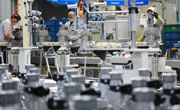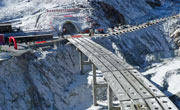Berlin(Germany)
Berlin(Germany)
[Overview] Berlin is the capital and largest city of Germany. It covers an area of 891 square kilometers and has a population of 3.748 million. In 1991, the German Bundestag decided that Berlin should be the capital and seat of government of Germany after reunification.
[Politics] Berlin is a city state in Germany and has twelve districts. The city is governed by the House of Representatives and the Senate. The House of Representatives is responsible for passing legislation and deliberating policies, budget and other important matters brought up by the government. It has 150 members elected for a term of five years. The Senate is the executive body governing the city of Berlin. It consists of the Governing Mayor of Berlin and ten senators, two of whom are appointed deputy mayors. Deputy mayors can represent the Governing Mayor of Berlin externally. They are equivalent to the executive deputy mayors of Beijing. Each of the remaining eight senators who do not have the title of deputy mayor presides over a department. The term of office of senators is five years. The Governing Mayor is elected by the House of Representatives and is responsible for appointing senators and proposing Senate departments. The Governing Mayor's proposals regarding the appointment of senators and the establishment of Senate departments take effect upon approval by the House of Representatives. The current mayor, Michael Müller, took office in December 2016.
[Economy] Berlin is one of the major industrial cities in Germany and its pillar industries are electronics, machine manufacturing, chemicals, printing, textiles and food processing. The service sector has the largest number of employees in Berlin. Transportation technology, biotechnology, medicine, media economy, information and communications technology, and environmental protection technology are also important industries in the city.
[Culture and Education] There are many opera houses, museums, galleries, cinemas and symphony orchestras in Berlin, where art festivals, film festivals and various exhibitions are held on a regular basis. There are dozens of universities and colleges as well as many research institutes in Berlin. The time-honored Humboldt University of Berlin and the Free University of Berlin are world-renowned universities.
[Relations with Beijing] On April 5, 1994, Beijing and Berlin established a sister city relationship. Since then, there have been frequent exchanges of high-level visits between the two cities. The two sides have engaged in close collaborations in the fields of investment, trade, science, technology, and culture. Overall, the relations between the two cities have been developing smoothly.
Investment and Trade: In 2018, Berlin Business Liaison Desk was established in Beijing. In the same year, the Administrative Committee of Zhongguancun Science Park established an incubator in Berlin and signed a memorandum of cooperation with Berlin Partner on the promotion of cooperation in the fields of life sciences, smart manufacturing, and new energy vehicles.
Science and Technology: In 2018, Beijing's Artificial Intelligence Technology Center (AITC) and the German Research Center for Artificial Intelligence (DFKI) signed a technology transfer agreement and the AITC European Research Institute was established in Berlin.
Culture: In 2019, to celebrate the 25th anniversary of the sisterhood between the two cities, Beijing staged folk music performances, intangible cultural heritage exhibitions, and tourism-themed photo exhibitions in Berlin.
Law Enforcement: From 1995 to 2004, Berlin's prison management delegation, police department specialists, and the deputy permanent secretary at the Senate Department for Justice, Consumer Protection and Anti-discrimination visited Beijing. Beijing has sent staff members of the local courts, procuratorates, public security departments, prison management departments, and notarial services offices to Berlin for training.
Gardening: In 1994, gardening experts from the two cities visited each other and agreed to build a Chinese garden in Berlin. Construction started in September 1997. Beijing was invited twice to send construction teams to Berlin to build the Chinese Garden of the Recovered Moon in the Gardens of the World and the construction was completed in October 2000. In 2017, at the request of Berlin, to prepare for the International Garden Exhibition Berlin 2017 and promote Chinese culture, Beijing helped Berlin complete the repair of the Chinese Garden of the Recovered Moon.
Other Fields: In July 2004, Chaoyang District of Beijing and Mitte of Berlin officially became sister districts. In September 2007, Dongcheng District of Beijing and Charlottenburg-Wilmersdorf of Berlin became sister districts.
柏林市(德国)
【概况】柏林市是德国首都和最大城市,面积891平方公里,人口374.8万。1991年德国联邦议院决定,柏林为德国统一后的首都和政府所在地。
【政治】柏林为德国的州级市,下设12个区,城市管理机构由市议会和市政委员会组成。市议会负责立法、审议政府提出的政策和预算等重要事务,有150名议员,任期5年。市政委员会负责城市管理等行政职能,由市长和10名成员组成,其中2人为副市长,可对外代表市长,等同于我市的常务副市长,其余8人无市长头衔,但分管柏林市各部事务,任期5年。市长由议会选举产生,其它市政委员及下属部门的设置和职能由市长提议,经议会批准后生效。现任市长米歇尔·穆勒于2016年12月就职。
【经济】柏林是德国主要工业城市之一,电子、机器制造、化工、印刷、纺织和食品加工等行业居主导地位。服务业是该市从业人员最多的一个行业。除此之外,交通技术、生物技术、医学、媒体经济、信息通讯技术及环保技术均是该市的重要行业。
【文化教育】柏林有许多歌剧院、博物馆、画廊、电影院和交响乐团,定期举办艺术节、电影节和各类展会。柏林市内有几十所大学、专科学院及数量众多的研究机构,历史悠久的洪堡大学和柏林自由大学是世界著名学府。
【两市交往】1994年4月5日,北京市与柏林市正式建立友好城市关系。结好以来,两市高层互访频繁,在经贸、科技、文化等领域开展了密切合作,双边关系总体发展顺利。
经贸领域:2018年,柏林市在京设立柏林驻华商务联络处。同年,中关村管委会在柏林市设立“中关村海外孵化器”,并与柏林经济技术促进局签订了合作备忘录,致力于推进双方在生命科学、智能制造、新能源汽车等领域的合作。
科技领域:2018年,北京深知无限人工智能研究院与德国人工智能研究中心签署技术转让协议,并在柏林成立北京深知无限人工智能欧洲研究院。
文化领域:2019年,为庆祝两市结好25周年,我市在柏林市举办小型民乐演出、非遗项目展示和旅游图片展。
司法领域:自1995年至2004年,柏林市监狱管理代表团、警察局专家、司法部副常务秘书等先后访京,我市相继派出法院、检察院、公安、监狱管理、公证员等团组赴柏林研修培训。
园林领域:1994年,两市园林专家互访,商定在柏林共建中国园林。1997年9月开始施工,之后我市曾应邀两度派遣施工队赴柏林修造中国园林“得月园”。2000年10月,“得月园”在柏林世界公园落成。2017年,应柏林市请求,为做好2017柏林“世界园艺展”的筹备工作并宣传和展示中国文化,我市协助柏林市完成“得月园”修缮工作。
其他交往:2004年7月,朝阳区与柏林市米特区结为友好区。2007年9月,东城区与柏林市夏洛腾堡-威尔敏斯多夫区结为友好区。
(Source: Foreign Affairs Office of Beijing Municipal Government)
[ Editor: WPY ]










More From Guangming Online
Medics from Fujian leave for Shanghai to aid in battle against COVID-19 resurgence
New int'l land-sea transport service to Indo-China Peninsula launched
Another makeshift hospital under construction in Shanghai
Tourists view tulips in Suiping County, Henan
In pics: blooming gagea flowers on grassland in Zhaosu, Xinjiang
Greek workers stage 24-hour general strike over high prices